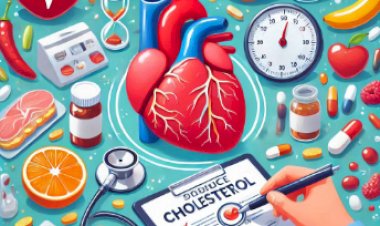Preventing High Blood Pressure: Tips for a Healthier Life
Learn about the causes and symptoms of high blood pressure and discover tips for prevention, including healthy lifestyle choices and dietary changes. Find out how you can manage and control hypertension to reduce the risk of serious health complications.
High blood pressure, also known as hypertension, is a condition where the pressure of the blood against the walls of the arteries is consistently high. Blood pressure is measured using two numbers, systolic and diastolic, which represent the pressure when the heart beats and when the heart is at rest between beats, respectively. Normal blood pressure is usually around 120/80 mmHg, but a blood pressure reading of 130/80 mmHg or higher is considered to be high.
High blood pressure is a serious health condition that can increase the risk of heart disease, stroke, kidney failure, and other health problems. It often has no symptoms, so it is important to have your blood pressure checked regularly by a healthcare professional. If left untreated, high blood pressure can cause damage to the arteries and organs, which can lead to serious health complications. However, with lifestyle changes and medical interventions, high blood pressure can be managed and controlled.
However, the good news is that high blood pressure can be prevented with some lifestyle changes and medical interventions. In this blog, we will discuss some of the ways to prevent high blood pressure.
- Maintain a healthy weight:
One of the major risk factors for high blood pressure is being overweight or obese. Excess weight puts a strain on the heart, and it can lead to a buildup of fatty deposits in the arteries. Therefore, it is important to maintain a healthy weight by eating a balanced diet and engaging in regular physical activity.
- Eat a healthy diet:
A healthy diet is one of the most effective ways to prevent high blood pressure. This includes eating plenty of fruits and vegetables, whole grains, lean protein, and healthy fats. Limiting your intake of processed foods, saturated and trans fats, and sodium is also important in maintaining a healthy diet.
- Engage in regular physical activity:
Regular physical activity is crucial for maintaining a healthy weight and preventing high blood pressure. It is recommended that adults engage in at least 150 minutes of moderate-intensity aerobic activity or 75 minutes of vigorous-intensity aerobic activity each week.
- Reduce sodium intake:
Sodium is a mineral that is essential for the body, but too much of it can lead to high blood pressure. It is recommended that adults consume no more than 2,300 milligrams of sodium per day, and individuals with hypertension should aim for even lower amounts.
- Limit alcohol intake:
Drinking excessive amounts of alcohol can lead to high blood pressure. It is recommended that men should have no more than two drinks per day, and women should have no more than one drink per day.
- Quit smoking:
Smoking is a major risk factor for high blood pressure and heart disease. Quitting smoking can reduce your risk of developing high blood pressure and other health problems.
- Manage stress:
Chronic stress can contribute to high blood pressure, so it is important to manage stress levels. Engaging in activities such as yoga, meditation, or deep breathing exercises can help reduce stress levels.
- Take medication as prescribed:
If you have been diagnosed with high blood pressure, it is important to take medication as prescribed by your healthcare provider. This can help to lower your blood pressure and reduce the risk of complications.
Foods to take to prevent high blood pressure:
Fruits and Vegetables: Fruits and vegetables are packed with nutrients such as potassium, magnesium, and fiber, which can help to lower blood pressure. They are also low in sodium, which is a major contributor to high blood pressure.
- Berries: Berries such as strawberries, raspberries, and blueberries are rich in flavonoids, which can help to relax blood vessels and lower blood pressure.
- Bananas: Bananas are high in potassium, which can help to counteract the effects of sodium and lower blood pressure.
- Citrus Fruits: Citrus fruits such as oranges and grapefruits are high in vitamin C and flavonoids, which can help to lower blood pressure and improve heart health.
- Apples: Apples are high in fiber, which can help to lower cholesterol levels and improve blood pressure.
- Pomegranates: Pomegranates are rich in antioxidants, which can help to protect against oxidative stress and lower blood pressure.
Whole Grains: Whole grains such as brown rice, quinoa, and oats are high in fiber, which can help to lower blood pressure.
Lean Protein: Lean protein sources such as skinless chicken, fish, and legumes are good options for reducing blood pressure. They are low in saturated fats, which can increase blood pressure.
Low-Fat Dairy: Low-fat dairy products such as skim milk, low-fat yogurt, and cheese are good sources of calcium, which can help to lower blood pressure.
Nuts and Seeds: Nuts and seeds are a good source of healthy fats, protein, and fiber, which can help to lower blood pressure.
Foods to avoid to prevent high blood pressure:
Processed Foods: Processed foods such as canned soups, frozen meals, and fast food are often high in sodium, which can increase blood pressure.
Saturated and Trans Fats: Saturated and trans fats found in fatty meats, butter, and fried foods can increase blood pressure.
Sugary Foods and Beverages: Sugary foods and beverages such as soda, candy, and baked goods can contribute to weight gain, which is a risk factor for high blood pressure.
Alcohol: Drinking excessive amounts of alcohol can increase blood pressure.
High-Sodium Foods: High-sodium foods such as canned foods, cured meats, and condiments can increase blood pressure.
In conclusion, preventing high blood pressure requires making healthy lifestyle choices such as maintaining a healthy weight, eating a balanced diet, engaging in regular physical activity, reducing sodium intake, limiting alcohol intake, quitting smoking, managing stress, and taking medication as prescribed. By following these steps, you can significantly reduce your risk of developing high blood pressure and other related health problems.

 Ashish Kumar
Ashish Kumar 













